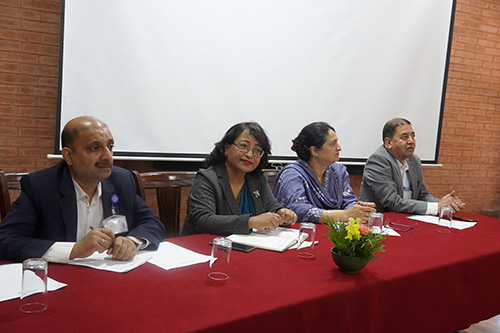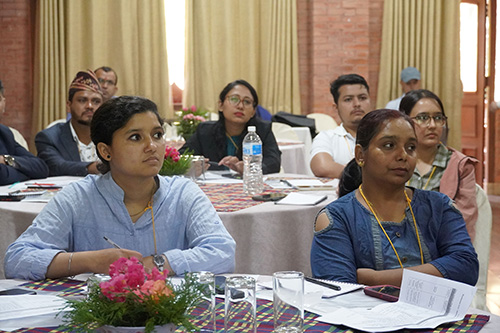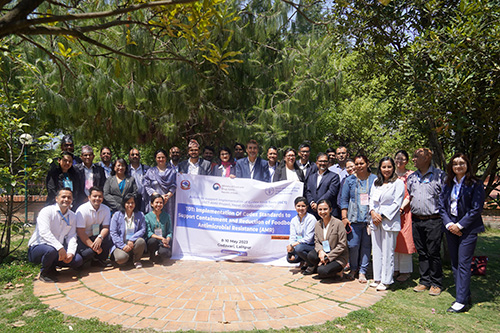ACT project in Nepal / Training on implementation of Codex antimicrobial resistance standards
FAO Nepal in collaboration with the Department of Food Technology and Quality Control, Ministry of Agriculture and Livestock Development conducted a training of trainers on the implementation of Codex standards to contain and reduce foodborne antimicrobial resistance (AMR). Twenty-three government officials from various departments representing food safety, public health, animal, and plant health, as well as the environmental agencies, participated in the training on 8-10 May 2023 in Godavari, Nepal.

Opening ceremony (Mr. Shailesh Kumar Jha, Deputy Director General, Department of Food Technology and Quality Control, Dr. Matina Joshi Vaidya, Director General, Department of Food Technology and Quality Control (also Codex Focal Point of Nepal), Ms. Sabnam Shivakoti, Joint Secretary, Ministry of Agriculture and Livestock Development, Mr. Arjun Thapa, Program Operation Specialist, FAO Nepal
Matina Joshi Vaidya, Director General of the Department of Food Technology and Quality Control (also Codex Focal Point of Nepal), Ministry of Agriculture and Livestock Development, underscored the impact of foodborne AMR on food safety and public health. Emphasizing the importance of collaboration, she expressed her strong commitment to the ACT project and using the One Health approach.
During the opening, Sabnam Shivakoti, Joint Secretary of the Ministry of Agriculture and Livestock Development conveyed support in implementing relevant policies based on the project findings related to the foodborne AMR status in Nepal. “We also need an improved surveillance and monitoring system,” Shivakoti said.
“It was crucial to bring together government counterparts working on foodborne AMR to understand this issue better, its implication on public health and the economy, and the importance of Codex texts,” said Sakar Shivakoti, National ACT Project Coordinator in Nepal.
discussed foodborne AMR from various perspectives including human and animal health, food safety, plant health, and the environment. They also learned about disease management, infection prevention systems, and national policies to tackle this issue.

Participants in the training (Dr. Sabina Lamsal, Veterinary Officer, Department of Livestock Services, Dr. Sikha Tiwari, Veterinary Officer, Department of Livestock Services)
“This training helped me to understand the fundamentals of Codex standards and why they matter. I will be able to contribute more to raising awareness at the grassroots level,” said Sabina Lamsal, Veterinary Officer at the Department of Livestock Services.
Narayan Poudyal, Scientist from Nepal Agriculture Research Council, noted that this training was useful to discuss the topic from different perspectives. “I believe the improved surveillance and monitoring system, as part of the ACT project, will help to understand the situation better and take actions accordingly,” said Poudyal.

Participants in the training
In Nepal, the ACT project will continue its efforts to raise awareness of Codex standards among food safety and veterinary stakeholders with a special focus on the poultry sector. Additionally, there are plans to assess the Central Laboratory’s diagnostic capacities using the FAO Assessment Tool for Laboratories and AMR Surveillance Systems (FAO-ATLASS). Furthermore, additional capacity-building trainings for food safety and veterinary officers are planned.
Learn more
Action to support implementation of Codex AMR Texts (ACT)
Photo credit ©FAO/Nepal
Main photo: Introduction (Mr. Sakar Shivakoti, National ACT Project Coordinator, FAO Nepal)
At the heart of the Codex mandate are the core values of collaboration, inclusiveness, consensus building and transparency. Governmental and non-governmental, public and private organizations alike play a vital role in ensuring Codex texts are of the highest quality and based on sound science.
Codex would have little authority in the field of international standard setting if it did not welcome and acknowledge the valuable contributions made by observers. Expert technical bodies, industry and consumer associations
contribute to the standard-setting process in a spirit of openness, collaboration and transparency.
Intergovernmental organizations (IGOs) and international non-governmental organizations (NGOs) can apply for observer status in Codex in order to attend and put forward their views at every stage of the standard-setting process.
 Current Codex Alimentarius Commission
Current Codex Alimentarius Commission
ACT project in Nepal / Training on implementation of Codex antimicrobial resistance standards
FAO Nepal in collaboration with the Department of Food Technology and Quality Control, Ministry of Agriculture and Livestock Development conducted a training of trainers on the implementation of Codex standards to contain and reduce foodborne antimicrobial resistance (AMR). Twenty-three government officials from various departments representing food safety, public health, animal, and plant health, as well as the environmental agencies, participated in the training on 8-10 May 2023 in Godavari, Nepal.

Opening ceremony (Mr. Shailesh Kumar Jha, Deputy Director General, Department of Food Technology and Quality Control, Dr. Matina Joshi Vaidya, Director General, Department of Food Technology and Quality Control (also Codex Focal Point of Nepal), Ms. Sabnam Shivakoti, Joint Secretary, Ministry of Agriculture and Livestock Development, Mr. Arjun Thapa, Program Operation Specialist, FAO Nepal
Matina Joshi Vaidya, Director General of the Department of Food Technology and Quality Control (also Codex Focal Point of Nepal), Ministry of Agriculture and Livestock Development, underscored the impact of foodborne AMR on food safety and public health. Emphasizing the importance of collaboration, she expressed her strong commitment to the ACT project and using the One Health approach.
During the opening, Sabnam Shivakoti, Joint Secretary of the Ministry of Agriculture and Livestock Development conveyed support in implementing relevant policies based on the project findings related to the foodborne AMR status in Nepal. “We also need an improved surveillance and monitoring system,” Shivakoti said.
“It was crucial to bring together government counterparts working on foodborne AMR to understand this issue better, its implication on public health and the economy, and the importance of Codex texts,” said Sakar Shivakoti, National ACT Project Coordinator in Nepal.
discussed foodborne AMR from various perspectives including human and animal health, food safety, plant health, and the environment. They also learned about disease management, infection prevention systems, and national policies to tackle this issue.

Participants in the training (Dr. Sabina Lamsal, Veterinary Officer, Department of Livestock Services, Dr. Sikha Tiwari, Veterinary Officer, Department of Livestock Services)
“This training helped me to understand the fundamentals of Codex standards and why they matter. I will be able to contribute more to raising awareness at the grassroots level,” said Sabina Lamsal, Veterinary Officer at the Department of Livestock Services.
Narayan Poudyal, Scientist from Nepal Agriculture Research Council, noted that this training was useful to discuss the topic from different perspectives. “I believe the improved surveillance and monitoring system, as part of the ACT project, will help to understand the situation better and take actions accordingly,” said Poudyal.

Participants in the training
In Nepal, the ACT project will continue its efforts to raise awareness of Codex standards among food safety and veterinary stakeholders with a special focus on the poultry sector. Additionally, there are plans to assess the Central Laboratory’s diagnostic capacities using the FAO Assessment Tool for Laboratories and AMR Surveillance Systems (FAO-ATLASS). Furthermore, additional capacity-building trainings for food safety and veterinary officers are planned.
Learn more
Action to support implementation of Codex AMR Texts (ACT)
Photo credit ©FAO/Nepal
Main photo: Introduction (Mr. Sakar Shivakoti, National ACT Project Coordinator, FAO Nepal)
 Codex and Observer
Codex and Observer
around the world since ancient times.
We might not always know where it comes from,
but we expect it to be available, safe and of good quality.









Leave a comment